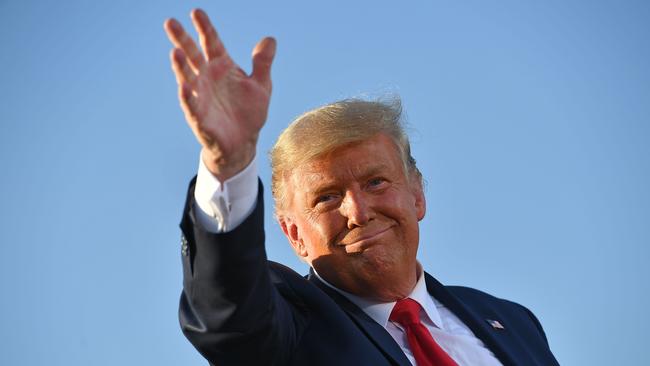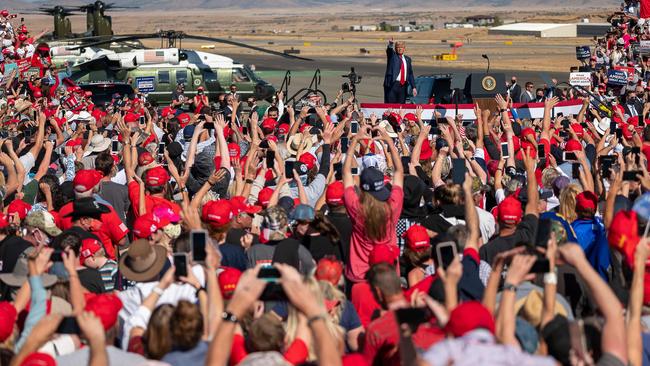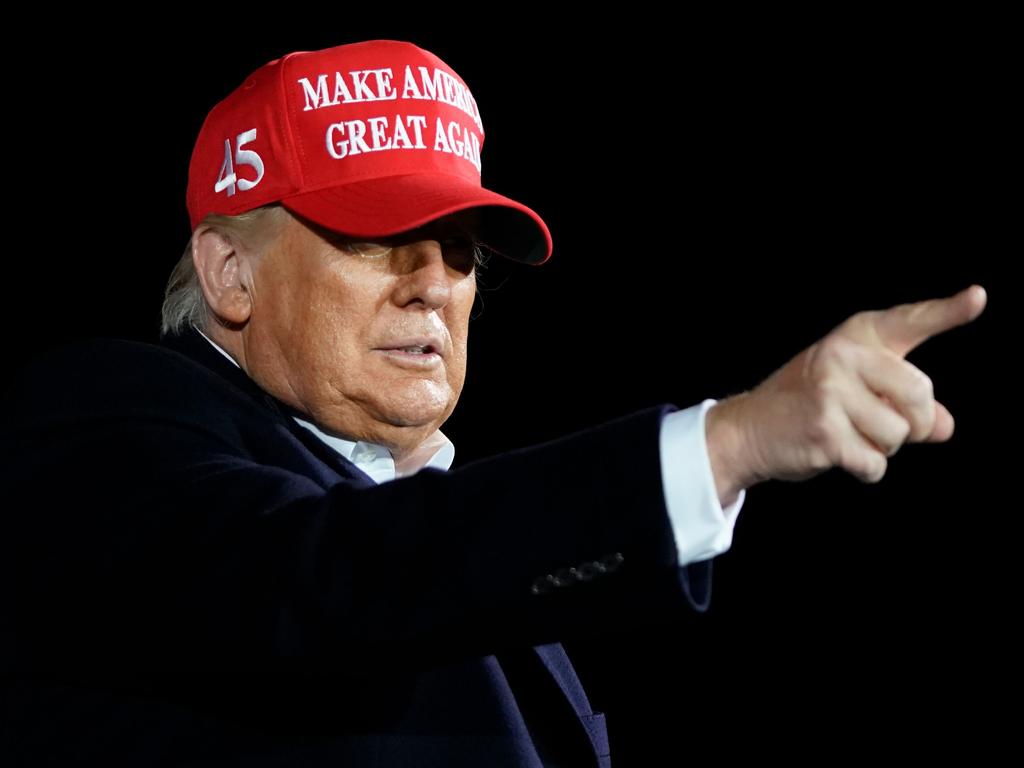
Both will be chaotic — but in their different ways. From his 2016 presidential victory Donald Trump has throttled and then recreated the American conservative movement under new values and ideas — yet the Trump revolution remains bitterly contested and the movement is divided against itself. This election is about the destiny of American conservatism. Trump is the most important transformative figure for conservatism since Ronald Reagan, with The Wall Street Journal’s Gerald F Seib saying of Reagan’s 40-year inheritance: “He personally made the Republican Party into a conservative party and his legacy inspired the movement’s leaders, animated its policy debates and stirred its voters’ emotions long after he left the scene.
“Then four years ago it all changed. Donald Trump ran in 2016 and swamped a sprawling Republican field. In doing so, he didn’t merely win the nomination and embark on the road to the White House. He turned Republicans away from four decades of Reagan-style national greatness conservatism to a new gospel of populism and nationalism.”
Seib calls the political revolution that saw the Reagan legacy buried in the Trump upheaval the “most important political story of the new millennium”. This is hard for Australians to grasp since there is no organised conservative movement in this country able to take command of a party like the Republican Party.
In America conservative ideology constitutes a throbbing, rampant, powerful coalition with ties to churches, corporates, small towns, middle-class virtue, blue-collar workers, the military, the flag and national pride. The thesis in Seib’s new book, We Should Have Seen It Coming, is self-explanatory — his story is the collapse of the Reagan foundations and Trump’s storming of the fortress.
In retrospect, it looks so obvious; it always does. The Reagan legacy hit the wall when the conservative movement turned against the Republican Establishment with the Bush family in its sights. In truth, the Reagan legacy was sandbagged by a changed world.
It came in unsuccessful wars after 9/11, the 2008 global financial crisis where Wall Street was saved and Little America punished, the arrival of China’s trade power at the cost of jobs in Middle America while poor services, compressed wages and skyrocketing incomes at the top end fermented a store of grievance. Seib says that when George W Bush left the White House in 2008 he identified three threats — isolationism, nativism and protectionism. They became the troika that Trump mobilised.
After Barack Obama’s 2012 re-election the Republicans faced an internal revolt. Trump’s one-time political guru, Steve Bannon, wanted to burn the edifice — he wanted to make rejection of immigration and free trade into the two biggest issues. Trump was neither a true Republican nor a reliable conservative. But the times suited a rebellious outsider who looked beyond the party establishment and exploited a rebellious conservative base. By contrast, the conservative power structure was aghast.
Trump offended at every level. Where Reagan had been a “morning in America” optimist, Trump warned of carnage as he raged and insulted; Reagan had a core of deeply held beliefs while Trump’s essential outlook was what suited his instincts and interests; where Reagan had an expansive view of US global leadership, Trump saw America as a victim being ripped off; where Reagan’s confidence saw him back immigration and free trade, Trump was a passionate double protectionist.
True conservatives saw the real threat. Hillary Clinton might defeat the Republicans but she could not betray their purpose. Trump could and he did. Yet Clinton had another role — along with the lurch to the left of the Democrats, she frightened many moderate conservatives who had no time for Trump. Seib said Republican National Committee chairman Reince Priebus swallowed his misgivings and “turned the keys to the party’s entire infrastructure over to the Trump campaign”.
“Still, even most people in Trump world didn’t think he would win,” Seib said of the 2016 contest. “Indeed, some of his campaign managers put Trump’s chance of winning at only 15 per cent.” But it was how Trump won that mattered — he largely repudiated the past policies and behaviour of Republican presidents as he exploited a grassroots hostility to nearly all forms of established power.
The core of Trump’s appeal lay in tribalism and nationalism. His message was the bankruptcy of old conservatism — it was too global, too Wall Street, too economic libertarian and out-of-touch elitist. Trump said what mattered were national borders, government intervention, cultural traditions and national pride. That meant knowing the differences between citizens and foreigners, jobs in China and jobs in America and honouring the difference between a man and a woman.
But Trump’s campaign against the system in 2016 was much easier than his 2020 campaign as an incumbent President. Four years in the White House have proved Trump does not possess the discipline, consistency and focus to entrench a new settlement based on populist and nationalistic conservatism.

Trump is a rebel, not a governor. He is a shooting star, not a policy builder. He cannot turn populist sentiment into a governing model. A narcissist obsessed by his own needs cannot create a new structure for his country. Every stakeholder quickly learnt Trump was a compulsive deal-maker.
Anything could be traded. Everything was negotiable. No principle would stand in the way of Trump’s advantage. His governing model violated every notion of conservative principle.
Companies, churches and Republicans — anyone who dealt with Trump — knew that trying to strike bargains was the only language he knew. Trump even told the Chinese that if they fixed the North Korea problem they’d get a trade dividend.
Classic conservatism is wary of executive power but Trump was addicted to executive assertion. He ran on instinct, not analysis. He saw history as bunk. He criticised allies and threatened to walk out of NATO. He was attracted to dictators with whom he could do deals.
He was obsessed with tariffs, cared nothing about budget deficits (before the pandemic) and had no interest in reforming government programs.
Seib quotes the “Never Trumpers” in the Republican Party saying: “Trump has blown up what used to be the ideological core of the party.” Can it be put back together? No, the Trump experience has changed American conservatism forever. It has been seduced by Trump’s success and the corrupting prospect he offers — that only Trump can resist the progressive tidal wave seeking to cancel every aspect of US cultural values and traditions.
By throwing in their lot with Trump, conservatives have turned their movement towards tribalism, populism and government intervention, rejecting both Adam Smith and Edmund Burke in favour of Trump’s “only I can fix it” narcissism. History will show it’s a bad deal.
Populism is the antithesis of conservatism. It rests upon stirring up passions, fuelling division, promoting polarisation and policy based on “reward and punish” transactions. Seib does a brilliant job in describing with detachment the transition from Reagan to Trump and the existential dilemma that confronts American conservatives regardless of who wins this presidential contest.








The future of American conservatism will be decided at the coming election with the two options being the self-destruction inherent in a Trump victory or the long agony of reinvention necessitated by a Trump defeat.